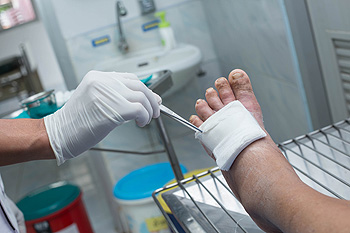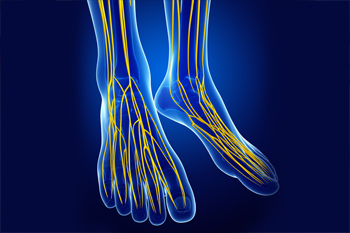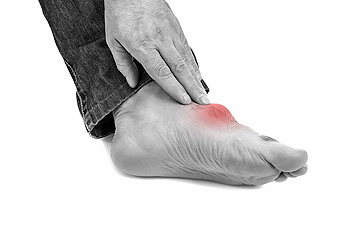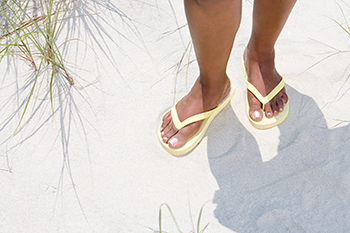Douglas Pacaccio, DPM
Thomas Nordquist, DPM
June 2021
Symptoms of Psoriatic Arthritis in the Feet
Psoriasis is a disease in which the body’s immune system malfunctions and attacks healthy tissue and producing an overabundance of skin cells. Outwardly, the disease causes red patches and scales on the skin. Inwardly, the disease may also cause inflammation, pain, and stiffness in joints and areas where ligaments and tendons connect with bones. This is known as psoriatic arthritis. Psoriatic arthritis often occurs in the feet with symptoms such as swollen toes (dactylis), heel pain, plantar fasciitis, and changes in the toenail. A podiatrist may perform various tests to help rule out other conditions such as gout, toenail fungus and rheumatoid arthritis which have similar symptoms. A variety of treatments, medicine, and orthotics may be used to help relieve pain and inflammation, and improve mobility.
Arthritis can be a difficult condition to live with. If you are seeking treatment, contact one of our podiatrists from Advanced Foot and Ankle Surgeons, Inc. . Our doctors can provide the care you need to keep you pain-free and on your feet.
Arthritic Foot Care
Arthritis is a term that is commonly used to describe joint pain. The condition itself can occur to anyone of any age, race, or gender, and there are over 100 types of it. Nevertheless, arthritis is more commonly found in women compared to men, and it is also more prevalent in those who are overweight. The causes of arthritis vary depending on which type of arthritis you have. Osteoarthritis for example, is often caused by injury, while rheumatoid arthritis is caused by a misdirected immune system.
Symptoms
- Swelling
- Pain
- Stiffness
- Decreased Range of Motion
Arthritic symptoms range in severity, and they may come and go. Some symptoms stay the same for several years but could potentially get worse with time. Severe cases of arthritis can prevent its sufferers from performing daily activities and make walking difficult.
Risk Factors
- Occupation – Occupations requiring repetitive knee movements have been linked to osteoarthritis
- Obesity – Excess weight can contribute to osteoarthritis development
- Infection – Microbial agents can infect the joints and trigger arthritis
- Joint Injuries – Damage to joints may lead to osteoarthritis
- Age – Risk increases with age
- Gender –Most types are more common in women
- Genetics – Arthritis can be hereditary
If you suspect your arthritis is affecting your feet, it is crucial that you see a podiatrist immediately. Your doctor will be able to address your specific case and help you decide which treatment method is best for you.
If you have any questions, please feel free to contact one of our offices located in Sycamore, and Yorkville, IL . We offer the newest diagnostic and treatment technologies for all your foot care needs.
Why Diabetics Should Regularly Visit a Podiatrist
 Diabetes can lead to a variety of complications in the feet, including amputation. This is because diabetics tend to lose sensation in their feet which makes it difficult to notice any problems. Diabetes also leads to poor blood flow in the feet which can lead to numbness and slow the time it takes for wounds to heal. Because of this, it is important for diabetics to create a foot care routine with their podiatrist. This daily routine usually involves checking the feet for wounds or sores, washing the feet, keeping the skin soft and smooth, and protecting the feet with properly fitting footwear. Regular check ups with a podiatrist are also important. A podiatrist will be able to create a customized foot care plan, help provide suggestions on safely treating wounds, and help to provide shoes specifically for diabetics.
Diabetes can lead to a variety of complications in the feet, including amputation. This is because diabetics tend to lose sensation in their feet which makes it difficult to notice any problems. Diabetes also leads to poor blood flow in the feet which can lead to numbness and slow the time it takes for wounds to heal. Because of this, it is important for diabetics to create a foot care routine with their podiatrist. This daily routine usually involves checking the feet for wounds or sores, washing the feet, keeping the skin soft and smooth, and protecting the feet with properly fitting footwear. Regular check ups with a podiatrist are also important. A podiatrist will be able to create a customized foot care plan, help provide suggestions on safely treating wounds, and help to provide shoes specifically for diabetics.
Diabetic foot care is important in preventing foot ailments such as ulcers. If you are suffering from diabetes or have any other concerns about your feet, contact one of our podiatrists from Advanced Foot and Ankle Surgeons, Inc. . Our doctors can provide the care you need to keep you pain-free and on your feet.
Diabetic Foot Care
Diabetes affects millions of people every year. The condition can damage blood vessels in many parts of the body, especially the feet. Because of this, taking care of your feet is essential if you have diabetes, and having a podiatrist help monitor your foot health is highly recommended.
The Importance of Caring for Your Feet
- Routinely inspect your feet for bruises or sores.
- Wear socks that fit your feet comfortably.
- Wear comfortable shoes that provide adequate support.
Patients with diabetes should have their doctor monitor their blood levels, as blood sugar levels play such a huge role in diabetic care. Monitoring these levels on a regular basis is highly advised.
It is always best to inform your healthcare professional of any concerns you may have regarding your feet, especially for diabetic patients. Early treatment and routine foot examinations are keys to maintaining proper health, especially because severe complications can arise if proper treatment is not applied.
If you have any questions please feel free to contact one of our offices located in Sycamore, and Yorkville, IL . We offer the newest diagnostic and treatment technologies for all your foot and ankle needs.
Symptoms of Lower Limb Peripheral Neuropathy
 Peripheral neuropathy is a condition in which one or more nerves of the peripheral nervous system are damaged. This often affects the lower limbs and may involve multiple nerves (polyneuropathy) or only one nerve (mononeuropathy). A single nerve may be damaged due to a sudden injury, prolonged pressure on the nerve, a local compression, or inflammation. Multiple nerves may be damaged due to systemic diseases, such as diabetes. The symptoms of peripheral neuropathy in the lower limbs include numbness, prickling, or tingling in the toes, burning, freezing, throbbing, or shooting pains, sensitivity to touch, and muscle weakness. If you are experiencing the symptoms of peripheral neuropathy in your feet or ankles, please seek the care of a podiatrist.
Peripheral neuropathy is a condition in which one or more nerves of the peripheral nervous system are damaged. This often affects the lower limbs and may involve multiple nerves (polyneuropathy) or only one nerve (mononeuropathy). A single nerve may be damaged due to a sudden injury, prolonged pressure on the nerve, a local compression, or inflammation. Multiple nerves may be damaged due to systemic diseases, such as diabetes. The symptoms of peripheral neuropathy in the lower limbs include numbness, prickling, or tingling in the toes, burning, freezing, throbbing, or shooting pains, sensitivity to touch, and muscle weakness. If you are experiencing the symptoms of peripheral neuropathy in your feet or ankles, please seek the care of a podiatrist.
Neuropathy
Neuropathy can be a potentially serious condition, especially if it is left undiagnosed. If you have any concerns that you may be experiencing nerve loss in your feet, consult with one of our podiatrists from Advanced Foot and Ankle Surgeons, Inc. . Our doctors will assess your condition and provide you with quality foot and ankle treatment for neuropathy.
What Is Neuropathy?
Neuropathy is a condition that leads to damage to the nerves in the body. Peripheral neuropathy, or neuropathy that affects your peripheral nervous system, usually occurs in the feet. Neuropathy can be triggered by a number of different causes. Such causes include diabetes, infections, cancers, disorders, and toxic substances.
Symptoms of Neuropathy Include:
- Numbness
- Sensation loss
- Prickling and tingling sensations
- Throbbing, freezing, burning pains
- Muscle weakness
Those with diabetes are at serious risk due to being unable to feel an ulcer on their feet. Diabetics usually also suffer from poor blood circulation. This can lead to the wound not healing, infections occurring, and the limb may have to be amputated.
Treatment
To treat neuropathy in the foot, podiatrists will first diagnose the cause of the neuropathy. Figuring out the underlying cause of the neuropathy will allow the podiatrist to prescribe the best treatment, whether it be caused by diabetes, toxic substance exposure, infection, etc. If the nerve has not died, then it’s possible that sensation may be able to return to the foot.
Pain medication may be issued for pain. Electrical nerve stimulation can be used to stimulate nerves. If the neuropathy is caused from pressure on the nerves, then surgery may be necessary.
If you have any questions, please feel free to contact one of our offices located in Sycamore, and Yorkville, IL . We offer the newest diagnostic and treatment technologies for all your foot care needs.
Read more about NeuropathyGout Pain Can Be Managed
Flip-Flops and Foot Problems
After a long winter, the sun is shining, the weather is warm, and you can finally wear your favorite flip-flops every day. Or, maybe not. Flip-flops, while relatively comfortable and easy to slip on, are not good for your feet. When you wear flip-flops, you may notice that you have to clench your toes around the edge of the shoe to keep it in place as you walk. This action is bad for the muscles in your feet and calves. The constant tension in your toes needed to keep that flip-flop on your foot can change your pattern of walking, make the toes stiff, and lead to foot and ankle injuries. Frequent flip-flop wearers may be more at risk of plantar fasciitis, a condition that causes stabbing heel pain and makes walking uncomfortable. Instead of flip-flops, try sandals that have a back and straps to keep your foot in place. If you have any foot or ankle pain, please consult with a podiatrist.
Flip-flops are not always the best choice of footwear. If you have any concerns about your feet or ankles, contact one of our podiatrists from Advanced Foot and Ankle Surgeons, Inc. . Our doctors will assist you with all of your foot and ankle needs.
Flip-Flops and Feet
When the weather starts warming up, people enjoy wearing flip-flops. Flip-flops are comfortable, stylish, and easy to slip on and off; they're perfect for any summer beach goer. However, these shoes can cause harm to the feet.
How Can Flip-Flops Affect Me Long-Term?
- Ankle problems
- Hip problems
- Lower back problems
- Pain in the balls of the feet
- Problems with foot arches
- Changes in the way you walk
Are There Injuries Associated with Flip-Flops?
Yes. Since flip-flops are relatively weak and do not provide the same amount of support as sneakers, people who wear flip-flops regularly are more susceptible to injuries. On top of that, the open nature of the shoe makes your feet more prone to other problems, such as cuts and even infections. Common injuries and ailments include:
- Sprained ankles
- Blisters
- Infections
- Cuts and Scrapes
I like Wearing Flip-Flops. Are There Safe Alternatives?
When buying flip-flops, try to find ones that have sturdy soles and that are made of high-quality materials that will support for your feet. These flip-flops will cost more but will also last longer as a result.
If you have any questions please feel free to contact one of our offices located in Sycamore, and Yorkville, IL . We offer the newest diagnostic and treatment technologies for all your foot and ankle needs.
How to Prevent Gout
 Gout is a very painful type of arthritis that is caused by a building up of uric acid. Gout most commonly forms in the big toe but can impact other joints in the body. When there is an excess amount of uric acid in the blood, the acid will crystallize around the joints, and they will become stiff, irritated, and painful. A healthy lifestyle is key to preventing gout. This includes maintaining a healthy weight, avoiding foods with high purines, and eating plenty of vitamin C. Patients who are struggling with gout pain in their big toe should be under the care of a podiatrist. A podiatrist will be able to help provide pain relief options that may include pain medications as well as footwear that helps alleviate the pain.
Gout is a very painful type of arthritis that is caused by a building up of uric acid. Gout most commonly forms in the big toe but can impact other joints in the body. When there is an excess amount of uric acid in the blood, the acid will crystallize around the joints, and they will become stiff, irritated, and painful. A healthy lifestyle is key to preventing gout. This includes maintaining a healthy weight, avoiding foods with high purines, and eating plenty of vitamin C. Patients who are struggling with gout pain in their big toe should be under the care of a podiatrist. A podiatrist will be able to help provide pain relief options that may include pain medications as well as footwear that helps alleviate the pain.
Gout is a painful condition that can be treated. If you are seeking treatment, contact one of our podiatrists from Advanced Foot and Ankle Surgeons, Inc. . Our doctors will treat your foot and ankle needs.
What Is Gout?
Gout is a form of arthritis that is characterized by sudden, severe attacks of pain, redness, and tenderness in the joints. The condition usually affects the joint at the base of the big toe. A gout attack can occur at any random time, such as the middle of the night while you are asleep.
Symptoms
- Intense Joint Pain - Usually around the large joint of your big toe, and it most severe within the first four to twelve hours
- Lingering Discomfort - Joint discomfort may last from a few days to a few weeks
- Inflammation and Redness -Affected joints may become swollen, tender, warm and red
- Limited Range of Motion - May experience a decrease in joint mobility
Risk Factors
- Genetics - If family members have gout, you’re more likely to have it
- Medications - Diuretic medications can raise uric acid levels
- Gender/Age - Gout is more common in men until the age of 60. It is believed that estrogen protects women until that point
- Diet - Eating red meat and shellfish increases your risk
- Alcohol - Having more than two alcoholic drinks per day increases your risk
- Obesity - Obese people are at a higher risk for gout
Prior to visiting your podiatrist to receive treatment for gout, there are a few things you should do beforehand. If you have gout you should write down your symptoms--including when they started and how often you experience them, important medical information you may have, and any questions you may have. Writing down these three things will help your podiatrist in assessing your specific situation so that he or she may provide the best route of treatment for you.
If you have any questions, please feel free to contact one of our offices located in Sycamore, and Yorkville, IL . We offer the newest diagnostic and treatment technologies for all your foot care needs.
Blog Archives
- July 2024
- June 2024
- May 2024
- April 2024
- March 2024
- February 2024
- January 2024
- December 2023
- November 2023
- October 2023
- September 2023
- August 2023
- July 2023
- June 2023
- May 2023
- April 2023
- March 2023
- February 2023
- January 2023
- December 2022
- November 2022
- October 2022
- September 2022
- August 2022
- July 2022
- June 2022
- May 2022
- April 2022
- March 2022
- February 2022
- January 2022
- December 2021
- November 2021
- October 2021
- September 2021
- August 2021
- July 2021
- June 2021
- May 2021
- April 2021
- March 2021
- February 2021
- January 2021
- December 2020
- November 2020
- October 2020
- September 2020
- August 2020
- July 2020
- June 2020
- May 2020
- April 2020
- March 2020
- February 2020
- January 2020
- December 2019
- November 2019
- October 2019
- September 2019
- August 2019
- July 2019
- June 2019
- May 2019
- April 2019
- March 2019
- February 2019
- January 2019
- December 2018
- November 2018
- October 2018
- September 2018











